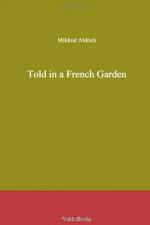“Which was right?” asked the Journalist.
“The scenario man.”
“How do you know?”
“How do I know? Why simply because the play was produced later—ran five years, and drew a couple of million dollars. That’s how I know.”
“By cricky,” exclaimed the Youngster, “I believe he thinks his story could earn a million if it had a chance.”
“I don’t say ‘no,’” said the Critic, yawning, “but it will never get a chance. I burned the manuscript this morning, and now being delivered of it, I have no more interest in it than a sparrow has in her last year’s offspring.”
“The trouble with you is that you haven’t any patience, any staying power. That ought to have been a three volume novel. We would have heard all about their first meeting, their first love, their separation, his marriage, her debuts, etc., etc.,” declared the Journalist.
“Oh, thunder,” said the Doctor. “I think there was quite enough of it. Don’t throw anything at me—I liked it—I liked it! Only I’m sorry she died.”
“So am I,” said the Critic. “That really hurt me.”
“Because,” said the Doctor, shying away toward the door, “I should have liked to know if the child turned out to be a genius. That kind do sometimes,” and he disappeared into the doorway.
“Anyhow,” said the Critic, “I am going to wear laurels until some one tells a better—and I’d like to know why the Journalist looks so pensively thoughtful?”
“I am trying to recall who she was—Margaret Dillon.”
“Don’t fret—she may be a ‘poor thing,’ but she is all ’mine own’—a genuine creation, Mr. Journalist. I am no reporter.”
“Ah? Then you are more of a sentimentalist than I even dared to dream.”
“Don’t deny it,” said the Critic, as he rose and yawned. “So I am going to bed to sleep on my laurels while I may. Good night.”
“Well,” called the Sculptor after him, as he sauntered away, “as one of our mutual friends used to say ’The Indian Summer of Passion scorches.’”
“But, alas!” added the other, “it does not always kill.”




